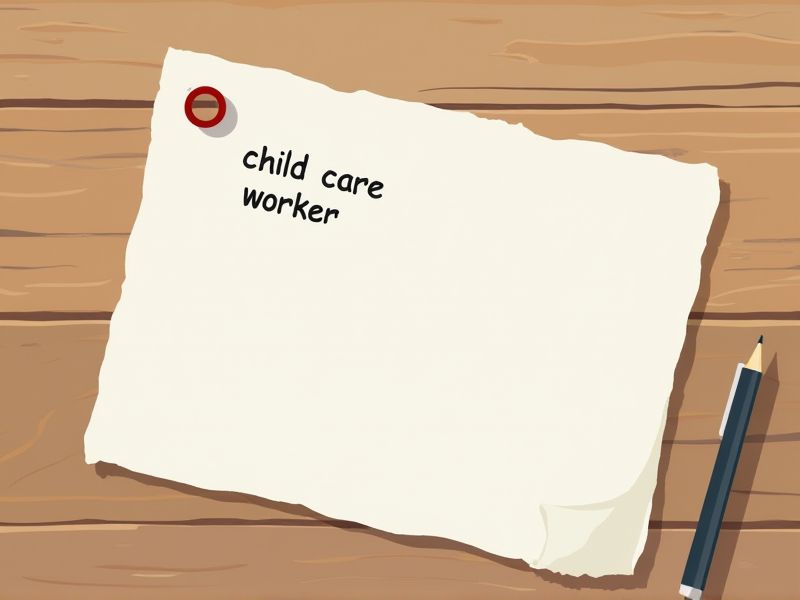
Child care workers play a critical role in early childhood development, which necessitates a foundational understanding of child psychology and safety protocols. Certain certifications ensure these workers are equipped to create nurturing and safe environments for children, addressing essential health and educational needs. Employers and parents look for certified professionals to trust with the physical and emotional well-being of young children. Some important certifications you may need as a child care worker include the following.
Child Care Worker Certification
Child Care Worker Certification ensures that caregivers have acquired essential skills and knowledge to provide safe and nurturing environments for children. It sets a standard for best practices, which can lead to improved developmental outcomes for the children under their care. Certification also builds trust with parents, as it demonstrates a commitment to professional standards and continuous education. In industries with evolving regulations and safety protocols, certification helps workers stay current and adherent to legal requirements.
Child Development Associate (CDA) Credential
The Child Development Associate (CDA) Credential improves the quality of early childcare, aligning workers with best practices and national standards. With the credential, childcare workers gain a deeper understanding of children's developmental stages and needs. Employers often prefer candidates with a CDA credential, which enhances job prospects and career advancement in the childcare industry. Possession of the credential demonstrates a worker's commitment to professional development and adherence to ethical childcare practices.
Pediatric CPR/First Aid Certification
Pediatric CPR/First Aid Certification equips child care workers with essential skills to respond effectively during medical emergencies, increasing the safety of children under their care. In unexpected situations like choking or falls, having certified knowledge can directly affect the outcome, potentially saving a child's life. This certification is often a legal requirement for child care professionals, ensuring compliance with industry standards and regulations. It also builds parental trust, as parents are more likely to choose a care provider who demonstrates a commitment to safety and professional responsibility.
Early Childhood Education Certificate
The Early Childhood Education Certificate equips childcare workers with essential skills and knowledge to foster children's development. It ensures that workers understand developmental milestones, enabling them to design age-appropriate activities. This certification often meets regulatory requirements set by childcare institutions to maintain quality standards. Holding this certificate can enhance career prospects and job stability within the childcare industry.
Infant and Toddler Care Certification
The Infant and Toddler Care Certification ensures child care workers understand developmental milestones crucial for early childhood growth. Certified workers are trained to recognize and respond to the unique needs of infants and toddlers, which improves safety and care quality. The certification standardizes professional expertise, which can lead to increased trust from parents. Requiring this certification often correlates with enhanced job prospects and career advancement in the child care industry.
First Aid and Emergency Preparedness Certification
Obtaining First Aid and Emergency Preparedness Certification equips a child care worker with the necessary skills to manage health crises that may arise among children. Increasing the odds of swift and effective response can reduce the severity of injuries or illnesses. Certification requirements often align with regulatory standards, ensuring compliance with daycare and educational facility mandates. Possessing this certification can enhance a caregiver's credibility and reassure parents, fostering trust and confidence in the care environment.
Child Abuse Prevention and Intervention Certification
Child Care Workers interact closely with children and are often the first to notice signs of abuse, so certification enhances their ability to identify and respond to these issues effectively. Training in prevention and intervention equips them with skills to create safer environments for children, reducing the likelihood of harm. Certified workers often gain greater trust from parents and guardians, which can lead to higher enrollment in child care programs. Many states and organizations require such certification to ensure compliance with regulations and standards aimed at child safety.
Special Needs Child Care Certification
Special Needs Child Care Certification equips child care workers with the necessary skills to address the unique requirements of children with disabilities, promoting a more inclusive and supportive care environment. Through certification, workers gain knowledge on various disabilities and appropriate interventions, resulting in better developmental outcomes for the child. Certification ensures compliance with legal and safety standards, reducing the likelihood of accidents or misunderstandings. Enhanced understanding and structured training lead to greater trust and satisfaction among parents and caregivers.
Nutrition and Health in Early Childhood Certification
Possessing a Nutrition and Health in Early Childhood Certification enhances a child care worker's ability to provide age-appropriate nutritional guidance, directly impacting children's growth and development. This certification equips caregivers with the knowledge needed to identify dietary deficiencies, which can affect cognitive and physical development in children. Access to this specialized education ensures caregivers can prevent and manage common health issues, such as obesity and food allergies, which require informed attention. Properly certified workers create safer and health-oriented environments, reducing the risk of malpractice and improving overall confidence among parents and guardians in the care facility.
Behavioral Management in Early Childhood Education Certification
Behavioral Management in Early Childhood Education Certification helps child care workers effectively address various behavioral issues in young children, promoting a safer and more conducive learning environment. With this certification, workers gain evidence-based strategies that enhance children's social and emotional development. Proper management of early behavioral challenges reduces future academic and interpersonal difficulties. Certification equips workers with tools to understand and cater to diverse learning and behavioral needs, aligning with educational standards.
Summary
When you obtain certifications as a Child Care Worker, your employability significantly improves. Certification equips you with updated skills, making you more effective in managing diverse child care situations. Employers are more likely to trust and hire you due to your verified competencies. Consequently, families and organizations feel assured about the quality of care you provide.
